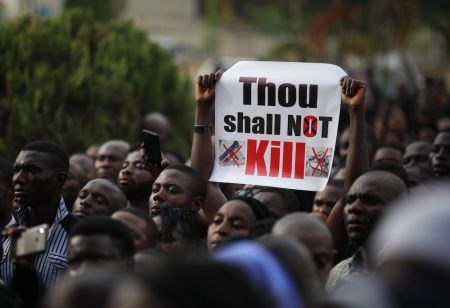FRC urges Trump admin. to sanction Nigeria; cut aid over inability to stop killings of Christians

A leading conservative evangelical advocacy group is calling on the Trump administration to consider sanctions against Nigeria in response to the government’s inability to thwart communal and extremist violence that has led to the deaths of thousands of Christians in recent years.
In a policy paper released last week, the Washington, D.C.-based Family Research Council called on the U.S. government to impose “hard-hitting sanctions” against Nigerian President Muhammadu Buhari and consider cutting aid to the West African country until steps are taken to address the violence routinely committed against Christian communities.
The new report, titled “The Crisis of Christian Persecution in Nigeria,” was written by FRC Senior Fellow for International Religious Freedom Lela Gilbert.
Gilbert and others working to restore religious freedom for Christians are calling on the Trump administration to appoint a State Department envoy for Nigeria as Boko Haram extremists and radical herdsmen continue to attack and kill hundreds of civilians each year.
The individual serving in this position would be responsible for making sure that violent attacks against Christians are documented accurately.
In the fiscal year 2020, the U.S. provided Nigeria with nearly half a billion dollars in foreign assistance. Gilbert’s report suggests making the foreign aid “conditional upon specific demands, such as governmental curbs on deadly attacks.”
In an interview with The Christian Post, Gilbert called on the global Christian community to rally in support of Christians facing persecution and death in Nigeria.
“We really have to pray for our Nigerian brothers and sisters because they are facing horrendous attacks and constant danger in some places,” Gilbert said. “We believe in doing all we can do otherwise, of course. But we also want to ask God to intervene to help these people. If our voices are raised as one, I know that He’ll hear us.”
Persecution and slaughter of Christians has been a common occurrence in Nigeria in recent years and the situation doesn't seem to be improving.
Referring to the country as a “killing field of defenseless Christians,” a report compiled by the Nigeria-based International Society for Civil Liberties & Rule of Law earlier this year estimates that between 11,500 and 12,000 Christian deaths were recorded between June 2015 and March 2020. The same group estimated that as many as 1,200 Christians have been killed in the first six months of 2020.
June 2015 was when Buhari first came to power.
Most of the bloodshed against Nigerian Christians has been attributed to radical members of the nomadic Fulani ethnic group, who have been accused of carrying out many brutal overnight attacks against predominantly Christian farming communities in the countries farm-rich Middle Belt, the Islamic terrorist group Boko Haram and its offshoot Islamic State West Africa Province in northeast Nigeria.
Gilbert’s paper criticized Buhari, an ethnic Fulani, for doing “virtually nothing to address the behavior of his fellow tribesmen.”
“Even after President Donald Trump publicly confronted him about violent attacks on Nigerian Christians, Buhari has not offered a substantive response to the crisis,” she wrote.
Christian leaders in Nigeria and some international human rights groups have described what has taken place in their country as a “genocide.”
Yet, as Gilbert noted, the U.S. and other western governments have taken little action over the years to hold the Nigerian government accountable for its apathy toward the genocide that has taken place in their country. Although the State Department last December added Nigeria to its “special watch list” of countries that engage in or tolerate severe violations of religious freedom, advocates want to see more action taken.
In her report, Gilbert cited the “deeply secular perspective of many diplomats, intelligence, and media talking heads” as one reason for the complacency regarding the crisis in Nigeria.
“These secularists greatly diminish or utterly overlook the role religious faith plays — for better or for worse — in the world,” she said. “More than a few policy-makers and media voices are convinced that religion simply amounts to cultural norms or a picturesque assortment of traditions rather than deeply held beliefs.”
Gilbert’s report also pointed to the perception that climate change is the driving factor behind the Fulani radical attacks on Christian farmers as fertile land is becoming more scarce.
“Initially, Fulani violence against Christians was attributed to climate change,” she wrote. “It has been widely reported that due to drought and the receding of pastures for their flocks, desperate Fulani migrant herders began to confiscate land on which to graze their animals. However, due to ever-increasing evidence of rampant bloodshed, outrageous brutality, and Islamist chants and declarations during attacks, the Fulani marauders’ jihadi intentions have been exposed.”
In spite of the lack of “observable concrete action” taken to address the terror against Christians in Nigeria thus far, Gilbert remains optimistic.
“The Trump administration has done more than any other administration in my memory to intervene in matters of religious freedom and Christian persecution,” Gilbert told CP.
“We’re hoping that some of these things will happen before the election. But of course, even if they don’t, then we’ll continue to push for them. We know that we have a responsive administration, and we really hope these things will be addressed quickly.”





















